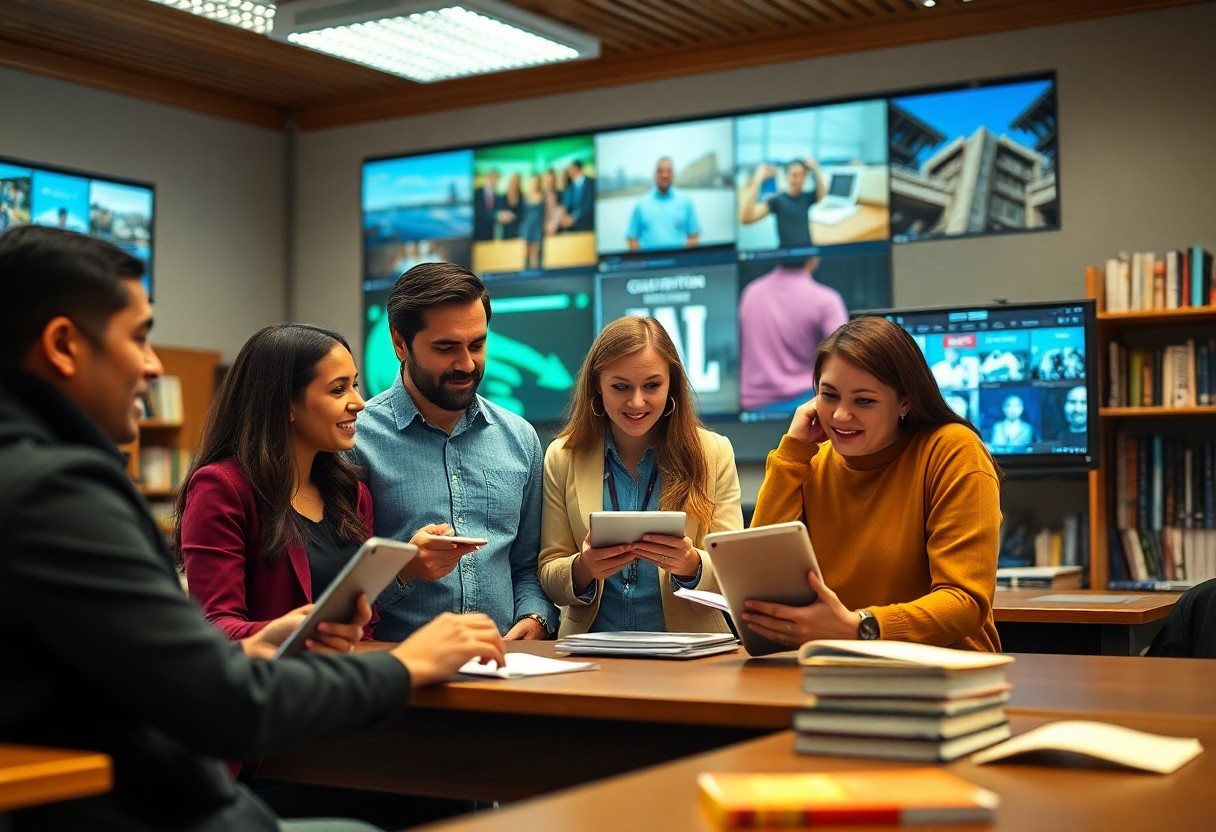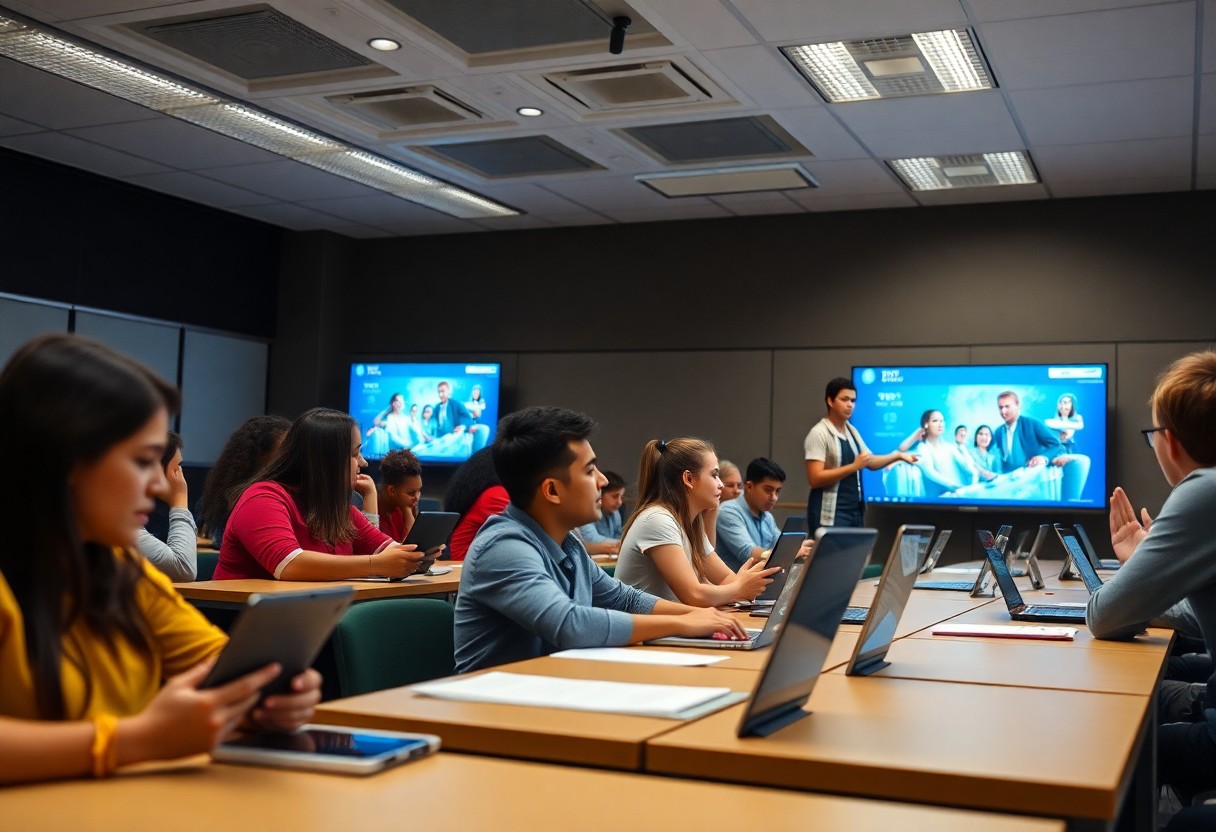Media plays a significant role in enhancing educational experiences in today’s digital landscape. If you’re looking to deepen your understanding of e-learning and integrate media effectively into your educational practices, pursuing a Master of E-Learning and Media Education (MELME) can be a transformative step for your career. This program equips you with the skills to design engaging online learning environments and utilize media tools to enhance student outcomes. Join this innovative field and empower yourself to make a meaningful impact in education through technology.
Key Takeaways:
- MELME combines advanced e-learning strategies with media education to equip educators and learners with the skills needed for digital literacy in contemporary classrooms.
- The program focuses on the integration of technology in education, emphasizing the importance of creating engaging and interactive learning experiences.
- Graduates of MELME are prepared to lead initiatives in educational technology, curriculum design, and to contribute to research in digital learning environments.

Redefining Learning Landscapes: The Fundamental Role of MELME
The evolution of education in the digital age demands innovative frameworks that challenge traditional approaches. MELME empowers you to navigate these shifting landscapes, equipping you with the knowledge and skills to enhance learning through effective media integration and e-learning strategies. The program emphasizes adaptability, ensuring that you are prepared to meet the diverse needs of learners in a variety of environments.
The Evolution of E-Learning and Media Education
E-learning has transformed significantly over the past two decades, transitioning from simple online courses to immersive, interactive experiences. With advancements in broadband access and mobile technologies, your learning options have expanded exponentially. Adaptive learning platforms and MOOCs (Massive Open Online Courses) have democratized education, allowing you to engage with material at your own pace and tailor your learning journey.
The Integration of Technology and Pedagogy
The integration of technology and pedagogy fosters a learner-centered approach that enhances engagement and promotes critical thinking. By using tools like learning management systems, multimedia content, and virtual collaboration platforms, educational experiences become more dynamic. This synergy allows you to not only absorb knowledge but also apply it practically, bridging the gap between theory and practice in meaningful ways.
As you dive deeper into this integration, consider how various tools can transform learning strategies. For instance, using podcasts can enhance auditory learning, while virtual reality environments allow for experiential learning that textbooks cannot replicate. By understanding your audience and selecting appropriate technologies, you can create rich, accessible, and compelling learning experiences that resonate with diverse learners. Data from recent studies reveals that technology-enhanced instruction leads to notable improvements in retention rates—up to 60% higher compared to traditional methods. This is your opportunity to leverage these insights and become a catalyst for educational innovation.
Building a Dynamic Curriculum: Core Components of MELME
MELME’s curriculum is tailored to prepare you for the complexities of modern educational environments, combining practical skills with theoretical knowledge. This dynamic curriculum emphasizes not only multimedia content creation but also data analysis and assessment strategies that enable you to facilitate engaging and effective learning experiences. Core components focus on integrating technology with pedagogy, allowing for a comprehensive understanding of how to leverage media effectively in various educational contexts.
Key Courses and Learning Outcomes
Your journey through MELME includes a selection of key courses designed to maximize your competencies in e-learning. Courses such as “Digital Curriculum Design” and “Assessment & Evaluation in E-Learning” equip you with vital skills to create, assess, and refine educational materials. Learning outcomes emphasize the creation of impactful digital content, the ability to analyze learner feedback, and the application of innovative technology to enhance teaching strategies, ensuring you emerge ready to meet educational challenges head-on.
Interdisciplinary Approaches: Merging Media Studies with Educational Theory
The integration of media studies with educational theory enriches your understanding of learning environments. By bridging disciplines, MELME cultivates a holistic perspective that highlights how media shape cognitive processes and affect learner engagement. This approach prepares you to assess and implement diverse educational frameworks, enhancing the effectiveness of your teaching practices.
By combining media studies with educational theories such as constructivism and cognitive load theory, you gain insights into how learners interact with content. For instance, applying principles of multifaceted engagement, as seen in problem-based learning scenarios, can lead to deeper learning outcomes. Exploring case studies that illustrate successful implementations of media strategies in educational settings further strengthens your capacity to design curricula that are not only innovative but also grounded in solid pedagogical frameworks. By fostering an interdisciplinary mindset, you enhance your ability to adapt to various learning contexts and optimize the potential of technology in education.
Navigating Challenges: Overcoming Barriers in E-Learning
E-learning presents unique challenges that can impede the learning experience. Addressing these barriers involves understanding access and equity issues as well as cultivating adaptability among educators. By recognizing the multifaceted obstacles learners face, you can implement strategies that promote inclusivity and resilience, ultimately enhancing the effectiveness of digital education.
Addressing Access and Equity Issues in Digital Education
Inadequate access to technology remains a significant hurdle in digital education. You may encounter students without reliable internet connections or proper devices, which can widen the educational gap. To combat this, advocating for policies that support equitable resource distribution, such as community internet initiatives and device lending programs, can ensure that all learners are equipped to participate in e-learning environments.
Resistance to Change: Cultivating Adaptability Among Educators
Educators often face resistance when adapting to new teaching methodologies in e-learning. This reluctance stems from comfort with traditional pedagogies and a lack of confidence in using digital tools effectively. Fostering a culture of continuous professional development, peer support, and exposing instructors to practical applications of technology can bridge this gap. By sharing success stories and providing access to training, educators can transition into adaptable, innovative practitioners ready to embrace the digital learning landscape.
Creating a supportive environment for educators is crucial in overcoming resistance to change. For instance, mentorship programs that pair tech-savvy teachers with those less familiar with digital tools are effective in bolstering confidence and competence. Offering incentives, such as recognition or opportunities for advancement, can further encourage educators to embrace new technologies. As they experience positive outcomes through these initiatives, you’ll notice a ripple effect where collaborative practices flourish, resulting in enriched learning experiences for students across the board.
The Future of MELME: Innovations on the Horizon
The landscape of MELME is rapidly evolving, driven by innovations that reshape educational paradigms. As you explore these developments, anticipate greater integration of immersive experiences, adaptive learning technologies, and data-driven insights that enhance learner engagement and retention. With the rise of artificial intelligence and virtual reality, the education sector is poised for a transformation that prioritizes personalized learning experiences over traditional models.
Emerging Technologies and Their Impact on Learning Experiences
Emerging technologies like AI, VR, and AR are revolutionizing learning experiences within MELME. These tools enable immersive environments that actively engage learners, fostering deeper understanding and retention. For instance, virtual classrooms can simulate real-world scenarios, allowing you to practice skills in a safe setting while receiving instant feedback tailored to your needs.
Global Trends and the Expansion of MELME Programs
Global trends indicate a significant increase in demand for MELME programs, expanding access and inclusivity in education. Countries worldwide are investing in digital platforms and resources to cater to learners from diverse backgrounds. Programs equipped with inclusive curricula that leverage technology are gaining traction, ensuring that you receive a high-quality education aligned with global needs.
This expansion is not limited to heightened enrollment numbers; it includes the diversification of course offerings to incorporate local and global perspectives. Education systems are becoming more interconnected, allowing you to benefit from collaborative projects that transcend geographical boundaries. For example, universities across continents are forming partnerships to share resources and provide joint programs, facilitating international learning experiences that enrich your educational journey and prepare you for a global workforce. The rise in MOOCs (Massive Open Online Courses) further exemplifies this global trend, making MELME programs accessible to you no matter where you are situated, thereby breaking down barriers to education and fostering a more inclusive learning environment.

Engaging Stakeholders: Collaboration for Success
Collaboration is at the heart of effective e-learning strategies. Engaging stakeholders—including educators, industry leaders, and students—creates a robust framework for innovation. When you foster relationships with various parties, you not only enhance course offerings but also ensure that your curriculum remains relevant and addresses the real-world challenges faced by learners. By taking proactive steps to involve all voices in the conversation, including leveraging insights from the Master E-Learning Management MELM – narovix.com, you’re paving the way for a more engaging and impactful educational experience.
Building Partnerships with Educational Institutions and Tech Companies
Creating strategic partnerships with educational institutions and tech companies invigorates your e-learning initiative. By collaborating with academic leaders, you can ensure that your curriculum reflects current educational standards and trends. Meanwhile, tech partnerships lend valuable insights into the latest tools and platforms, enhancing the learning experience and providing students with real-world applications of their studies.
Involving Students in the Curriculum Development Process
Involving students in the curriculum development process not only fosters engagement but also ensures that the courses resonate with their needs and aspirations. You can gather feedback through surveys or focus groups, facilitating a two-way dialogue that empowers students to contribute ideas and voice their expectations. This collaborative approach ensures that the final product is relevant and motivating for learners.
Focusing on student involvement allows you to tailor educational offerings to meet diverse learner needs. When participants play a role in shaping their educational journey, they become more invested in their success. For instance, having students review materials, propose projects, or suggest topic areas can lead to innovative ideas that might not have emerged through traditional approaches. Incorporating their perspectives creates a more engaging learning environment that reflects their interests and career ambitions, ultimately enhancing the impact of the curriculum.
Final Words
Presently, pursuing a Master of E-Learning and Media Education (MELME) equips you with necessary skills to excel in digital education. This program not only enhances your understanding of innovative teaching methods but also empowers you to create engaging and effective learning environments. You gain the expertise necessary to navigate the rapidly evolving landscape of e-learning and media education, positioning yourself as a leader in this dynamic field. By investing in MELME, you set yourself up for a successful career that integrates technology and education seamlessly.

